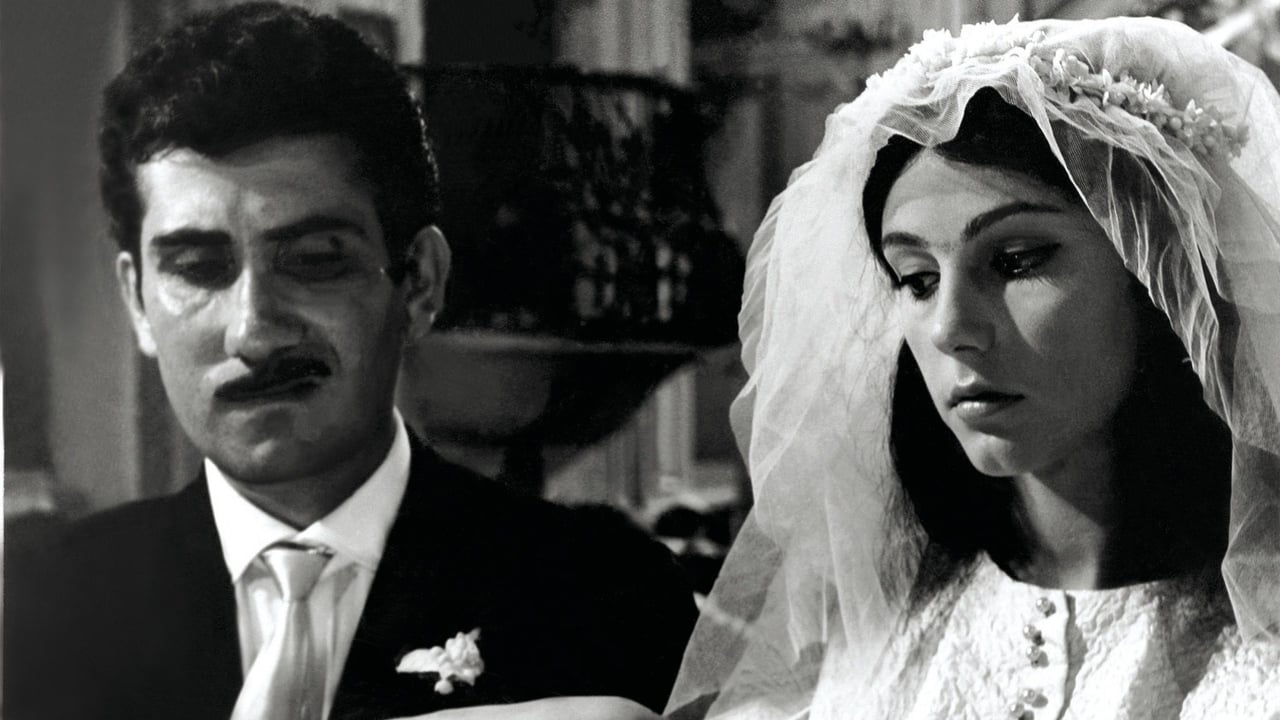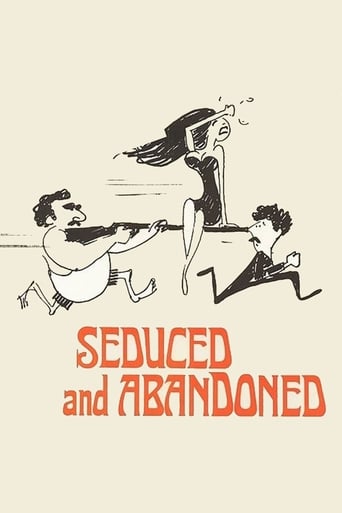

Most undeservingly overhyped movie of all time??
... View MoreGood start, but then it gets ruined
... View MoreFantastic!
... View Morea film so unique, intoxicating and bizarre that it not only demands another viewing, but is also forgivable as a satirical comedy where the jokes eventually take the back seat.
... View MoreI don't have the necessary English vocabulary to praise this jewel of a film. But no matter how wide the knowledge of a language can be, one will always fall short when praising this remarkable creation.Simply amazing: Director (Pietro Germi), actors, camera, script... Perfection, absolute perfection. Every single situation is played with amazing vitality and bubbling gags are practically in every scene in this bittersweet story.One hopes Sicilians have changed their "morals" from the 1950s to today, because nowadays the conflict depicted here seems unreal and preposterous: A guy (Peppino Califano) refuses to marry the girl (Stefania Sandrelli) (15 going to 16) because, "since she gave in to his sexual advances", now she's considered a "Puttana" and men require to marry virgins, otherwise he'll be the laughing stock in the village (a Cornuto).The central character of the story is the father of this girl, the "offended" party, and the fireworks displayed by this actor (Saro Urzi) are just out of this world. The beauty of Stefania Sandrelli was also out of this world, as she looks like a Madonna painted by a Rinascimento master.And she breaks our hearts finding herself in that tremendous conflict that will take her to an inevitable nervous breakdown. Again, women's position in Sicily was very close to total servitude to the dominant male in the family.Lightweight comedy for a wrenching situation until the very bitter ending. Try watching this impossibly wonderful movie, a gift from the Gods of Cinecittà.
... View MorePietro Germi is probably my favorite director of commedia all'italiana films, but to understand him, we have to understand commedia all'italiana, and to do that, we have to examine its roots, which lie in the Italian neorealist movement.Italian neorealism was forged out of the ashes of World War II. After suffering Mussolini's dictatorship and Italian Fascism, followed by Nazi occupation, followed by American occupation, Italy's identity as a nation had been decimated. The new identity it would build in the postwar years would be defined in every way by the war. In cinema, directors began shooting low-budget, inexpensive films with a realistic aesthetic. This was, on one hand, a product of necessity, due to the economic impact of the war, and, on the other hand, it was an artistic choice, since the neorealists believed in a cinema that echoed reality, which meant natural lighting, nonprofessional actors, and on-location shooting. In terms of the films' content, they often featured a deep sympathy with the working class, which was the hallmark of the Marxist school of thought that was quickly beginning to dominate Italian cinema. Having recently seen the other end of the political spectrum (i.e. fascism) up close and personal, the shift leftward to communism was virtually inevitable. The other notable aspect of these neorealist films is their highly melancholic tone and grim portraits of human despair. This, too, of course, was a result of the horrors seen during the war.Time heals all wounds, however, and by the mid-'50s, Italians were ready to wake from their doldrums and shake off the depression that had marked the years immediately following the war. Italian cinema would have to adapt. For a nation that was finally ready to laugh again, the influx of comedy into Italian films was only natural. And so the '50s saw the rise of a very unique brand of comedy that would come to be called commedia all'italiana ("comedy Italian style", borrowing its name from Germi's own 1961 film, "Divorce Italian Style"). Italian cinema now had the money and the motivation to make more commercial, more traditionally entertaining films, and while the neorealist mode of filmmaking had largely vanished by the mid-'50s, it survived through commedia all'italiana, which can best be described as an amalgam of the social realism that dominated the neorealist movement and a more conventional comedy. Commedia all'italiana, in a way, can be seen as half comedy, half neorealism, and while infusing neorealism with comedy may not sound like a good mixture, this blend of styles actually created some of the most enjoyable films in Italian cinematic history.The directors who made films during the era of commedia all'italiana, for the most part, had apprenticed under the neorealists, and as a result much of the neorealist approach permeated their films. While the films they made were certainly comedies, they retained a poignancy, and an element of pathos, that was characteristic of Italian neorealism, and which transcended the conventions of comedic filmmaking. These filmmakers, like many of the neorealists before them, were largely communists, although it's been suggested that many only joined the party in an effort to further their careers.And this, at last, brings us to Germi. Unlike fellow commedia all'italiana filmmaker Mario Monicelli, who was a committed, lifelong communist, Germi considered himself a social democrat. In other words, he believed in social equality, as did the left, but refused to subscribe to any specific political ideology. Germi and Monicelli both delivered indictments of society in their films, but unlike Monicelli's films, which operate on a sympathy with the working class, Germi's films are an attack on traditional, conservative values in Italian culture, specifically in the south.While Monicelli's films tend to take place in Rome or northern cities like Turin, the films I've seen by Germi are set in Sicily, where conservative values regarding female chastity and familial honor were, certainly at the time of the film's release, at a maximum. Germi's films seem to revolve around individuals who are compelled toward unscrupulous choices and ultimately cast into a state of chaos by the rigid values of the society they live in. In "Divorce Italian Style", the protagonist lives in a Sicilian society that will not allow him to divorce (not without losing his honor and shaming himself as a cuckold), and so the only course of action left to him is to murder his wife (a comic premise, of course). In "Seduced and Abandoned", the patriarchal head of a family goes to absurd lengths to try to preserve his family's good name by covering up the corruption of his daughter's virtue at any and all costs. In both films, we have a scenario in which completely normal, or at least non-calamitous events (the failure of a marriage, consensual sex between a fairly young man and a girl on the verge of adulthood) are elevated to a state of complete catastrophe by what Germi sees as society's ridiculous values and mores. "Seduced and Abandoned" is a scathing assault on these kinds of social mores, and despite Germi's refusal to engage a specific political doctrine, it is very much a political film. What makes it so successful, like "Divorce Italian Style", is the way Germi is able to execute his films in such a way as to make them enjoyable on two levels: as a meaningful reflection on the flaws and shortcomings of Italian society, and as pure, lighthearted, comedic entertainment. As the viewer, we have the prerogative of choosing which level to absorb. I recommend both.RATING: 8.33 out of 10 stars
... View MoreThe photography, direction, acting, music, all is surprisingly flawless for a comedy. It's the story that trips this movie up, but even that is strong for the first two thirds. For the first two-thirds, the movie reaches for the best and achieves what the greatest comedies have achieved. But somewhere towards the end, the plot turned unrealistic to me. Things just got a little more complicated than I felt was believable. I felt as if the director had taken us out for a lovely outing and then he suddenly began to freak out because he couldn't find the way back home. By the time, the word "FINE," appeared on the screen, I had lost all sympathy and amusement for the characters. Argh, it feels like a wasted opportunity! But give it a shot, and see what you think. At least, the first half was a treat, and Stefania Sandrelli's performance is a nice consolation throughout.
... View MoreIt is so rare to watch a funny masterpiece with so many insights! Sicily in the 50's appears obsessed with a twisted concept of honor, or, better, of an impeccable APPARENT reputation. No other movie I have seen is able to give such a vivid idea of the double morality for men and women that ails the "cultura machista". The character I love most in the movie is the extremely naive sister of the protagonist, who lives in her romantic world and does not realize what kind of tragicomic events are happening around her. In a word, truly a masterpiece.
... View More